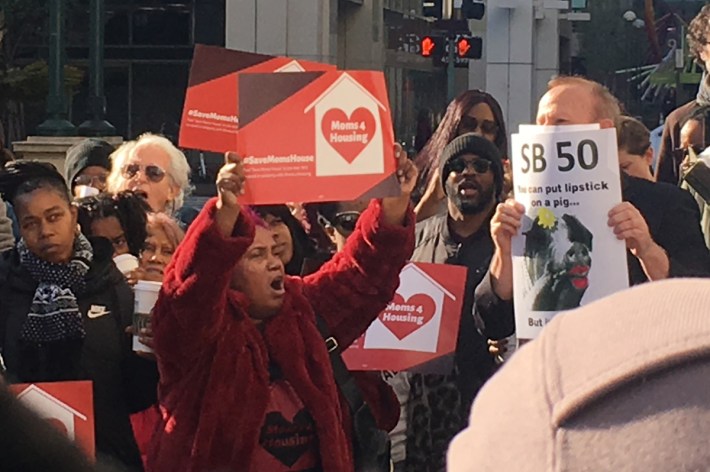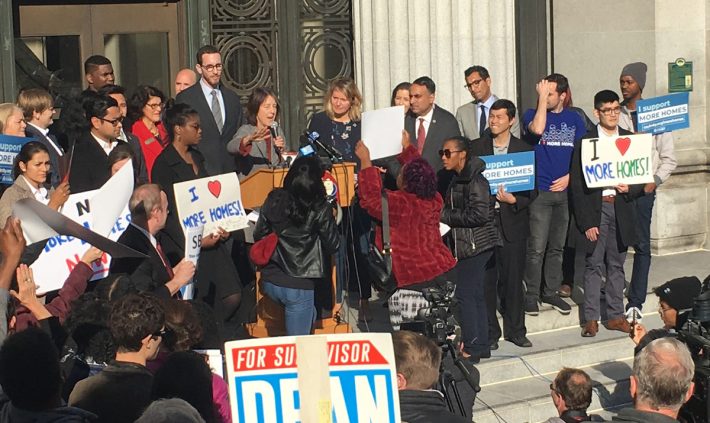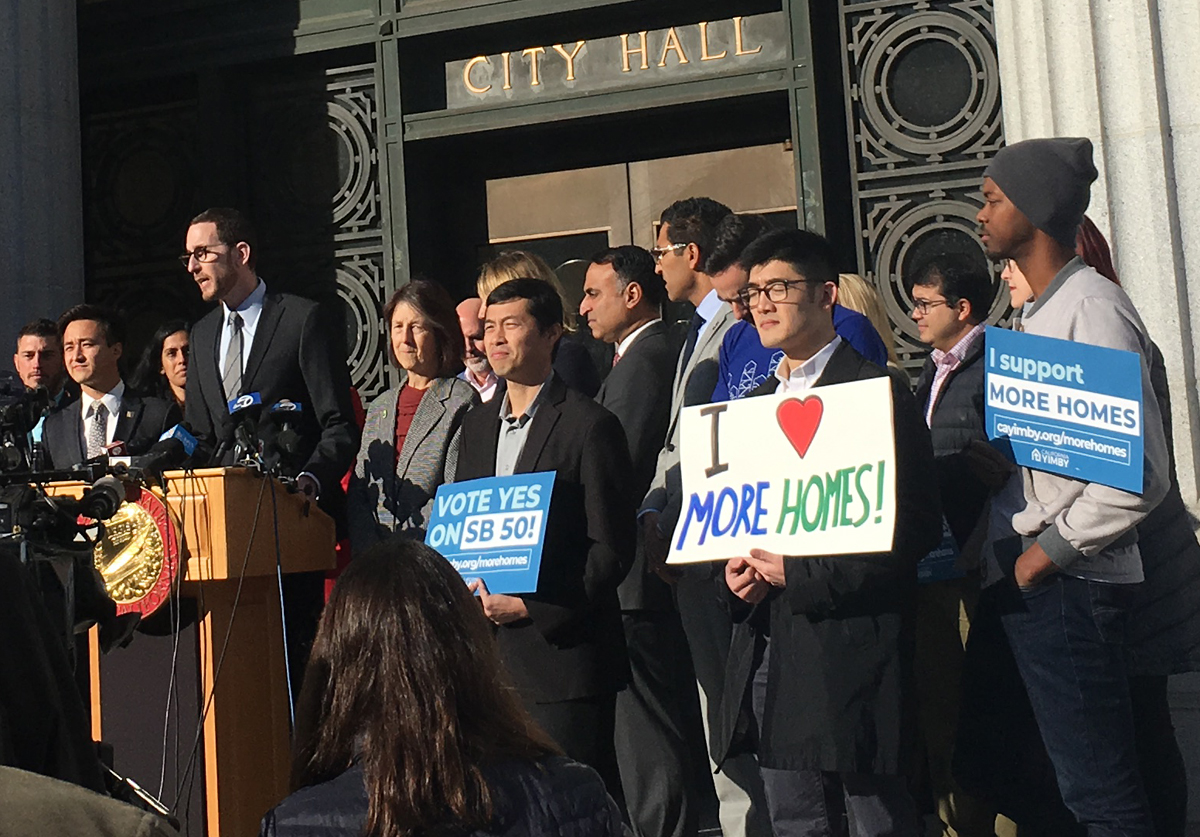Note: GJEL Accident Attorneys regularly sponsors coverage on Streetsblog San Francisco and Streetsblog California. Unless noted in the story, GJEL Accident Attorneys is not consulted for the content or editorial direction of the sponsored content.
Senator Scott Wiener (D-San Francisco) reintroduced his ambitious bill to increase housing near transit, S.B. 50, to a raucous crowd on the steps of Oakland City Hall today. The scene is an indication of how important the housing crisis in California is, and how complicated it will be to fix it.
And it's an indication of what Wiener's bill might be up against in the legislative session.
It would be safe to say that most of the people in the crowd support more housing, but they are deeply split on tactics for achieving it. Attendees seemed about evenly split between supporters and opponents of S.B. 50. Members of CA YIMBY held up signs in support; other groups, including some supporting Moms 4 Housing, held up signs accusing the bill's amendments of being "lipstick on a pig."
As soon as the first speaker approached the mic, opponents began shouting. For a moment, both sides joined in. "What do we want?" shouted many in unison. "More Housing!" shouted some, while others yelled out, "Affordable Housing!"
Opponents kept up the chants throughout the speeches, and it was impossible to hear many of the S.B. 50 supporters who took the mic. Senator Nancy Skinner (D-Berkeley), who has worked on a range of bills addressing the housing shortage and funding for affordable housing, tried to say something about the urgency of creating affordable housing. But she couldn't be heard for the chanting: "Where's the affordable housing?"
The shouters quieted down briefly when Darrell Owens of East Bay for Everyone approached the mic. But as soon as they realized he was speaking in support of S.B. 50, they started up again.
Opponents held up signs in the faces of the speakers, and crowded around Senator Wiener afterward, shouting slogans as he tried to answer questions from the media.

S.B. 50 is definitely a difficult balancing act. On one hand, California cities need to change their zoning codes to allow denser housing, especially near transit. More housing is needed, and putting new housing near transit will make it easier for residents to lessen their reliance on cars.
But as cities around the state--Oakland, San Francisco, Sacramento, Los Angeles--have seen new developments of high density housing, the already dangerous threat of displacement has become more urgent. In addition to sometimes demolishing older, currently affordable housing stock, new market-rate development puts upward pressure on housing prices, and rents, in existing housing nearby.
It's what urbanists call a "wicked problem": one that is so complex it seems impossible to solve. On the one hand, more housing is needed, by encouraging development and removing obstacles. But it’s also important not to displace current residents.
Wiener has chosen to focus S.B. 50 on underlying zoning issues, to force cities to allow denser housing near transit. The latest version of S.B. 50 contains amendments in response to objections from cities and counties that object to losing control over their own zoning. For example, the bill now includes a provision to give local jurisdictions two years to come up with their own alternative zoning that meets S.B. 50's goals of increasing housing in an equitable way. It also removed a controversial provision allowing duplexes and triplexes in areas zoned for single-family housing--because that was included in a separate bill that passed last year.
Previous versions of S.B. 50 included some tenant protection, minimum requirements for affordable housing, and some anti-displacement provisions. But opponents at the press conference in Oakland said that is not enough. They objected to what they called Wiener's "top-down" approach, accusing the Senator of not engaging with people who are suffering the most from the lack of housing. They say they do not see their concerns reflected in the bill.
"Our goal was to keep the press conference from happening, because the bill has zero percent for affordable housing," one of the chanters told Streetsblog.

Senator Wiener and his supporters have been working for more than two years on this bill, trying to get statewide agreement on a way to encourage the production of new housing. But concerns about displacement are real. Just changing zoning won't solve the affordable housing issue by itself, and may well make it worse.
"We oppose profiteering on housing," said Dominique Walker, one of the members of Moms 4 Housing. That group of homeless mothers has been occupying an empty, corporate-owned house in Oakland for the last few months and bringing attention to the contradiction of vacant, high-priced units in areas where people are living on the street.
"We don't want speculators in our community," she said. "The luxury buildings going up have high vacancy rates, and they are not the solution for people like me."
Walker said the solution is to open up currently vacant units. The group claims there are four vacant units for every homeless person in Oakland--presumably that includes empty units in new luxury high-rises. "Create affordable housing," she added, "and reach out to organizations that work with homeless people and affordable housing advocates."
As a two-year bill, S.B. 50 faces a quick deadline: it must be passed on the floor of the Senate by January 31.
Follow Streetsblog California on Twitter @StreetsblogCal






